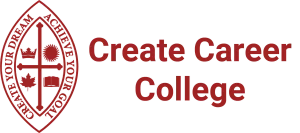- HOME
- PROGRAMS
- ADMISSIONS
- STUDENT AFFAIRS
- MEDIA
- PAYMENT
- CONTACT
- HOME
- PROGRAMS
- ADMISSIONS
- STUDENT AFFAIRS
- MEDIA
- PAYMENT
- CONTACT

Accounting Diploma with Co-op
1 Year Lecture + 1 Year Co-op
The Accounting Diploma program at Create Career College (CCC) is designed to prepare students in the field of accounting, finance, and taxation. The structure of the accounting program includes lectures, assignments, and projects. In addition, the Accounting Diploma program is carefully aligned with the requirements of Chartered Professional Accountant and Public Business Accountancy.
Therefore, students are prepared for the preliminary accounting courses in Vancouver & online. Our experienced accounting instructors with CPA qualifications supervise students with their assignments and projects to offer a real-world perspective to the students. Upon successful completion of the Accounting Diploma program at Create Career College, students are qualified for entry level bookkeeping, payroll, and taxation positions.
Accounting Diploma Details
Explore the comprehensive accounting college programs below, offered at Create Career College in Vancouver, BC. & online.

Accounting Programs combine instructor-led lectures, guest speakers, case studies, presentations, online reading and exams. Online delivery will utilize Canvas (Learning Management System) to host lectures, assign homework, start discussions and monitor attendance.
We will have a one-hour training session for instructors and a separate training session for students. For additional support, instructors and students can contact our IT staff for technical support.
- Demonstrate good communication skills at business place
- Calculate different statistical indicators
- Demonstrate ability to use Microsoft office applications
- Demonstrate basic and intermediate level knowledge of accounting and related areas
- Perform basic chores of financial accounting
- Use major techniques of managerial accounting
- Calculate taxes and other deductions
- Calculate payrolls and deductions
- Demonstrate accounts receivable and payable skills
- Calculate different indicators of finance and personal finance
- Demonstrate proficient use of software in accounting business goals and the target market
 Create Career College offers online accounting diploma course options for most programs. Domestic and international students are able to develop skills for career growth wherever they are. With small class sizes, our online accounting diploma courses have experienced and remarkable instructors, ensuring immediate response and feedback for the best assistance.
Create Career College offers online accounting diploma course options for most programs. Domestic and international students are able to develop skills for career growth wherever they are. With small class sizes, our online accounting diploma courses have experienced and remarkable instructors, ensuring immediate response and feedback for the best assistance.
- Student must be a high school graduate or equivalent or above;
- Student must be at the age of 19 years old or over on the first day of class;
- To enter our Accounting Diploma programs, applicants must meet 1 of the following English proficiency requirements;
- Successful completion of the Create Career College’s English as a Second Language (ESL) program, a prerequisite to vocational and academic programs in Create Career College, or
- Obtaining a minimum score of 80 on TOEFL iBT, or a minimum overall band score of 6.0 on the IELTS academic module, or
- Successful completion of Grade 12 from a Canadian High School or equivalent, or
- A score of at least 60% on the Create Career College English Placement Test.

Combination of Instructor-led lectures, guest speakers, case studies, presentations, online reading and exams. Online delivery will utilize Canvas (Learning Management System) to host lectures, assign homework, start discussions and monitor attendance.
- Demonstrate good communicationskills at business place
- Calculate different statistical indicators
- Demonstrate ability to use Microsoft office applications
- Demonstrate basic and intermediate level knowledge of accounting and related areas
- Perform basic chores of financial accounting
- Use major techniques of managerial accounting
- Calculate taxes and other deductions
- Calculate payrolls and deductions
- Demonstrate accounts receivable and payable skills
- Calculate different indicators of finance and personal finance
- Demonstrate proficient use of software in accounting business goals and the target market

Create Career College offers online course options for most programs. Domestic and international students are able to develop skills for career growth wherever they are. With small class sizes, our experienced and remarkable instructors ensure immediate response and feedback for the best assistance.
| Domestic | International | |
| Net Tuition | $ 15,520 | $ 22,420 |
| Application | $ 200 | $ 1,000 |
| Textbook | $ 1,500 | $ 1,500 |
| Admin Fee | N / A | N / A |
| Other | N / A | N / A |
| Total | $17,220 | $24,920 |
- Student must be a high school graduate or equivalent or above;
- Student must be at the age of 19 years old or over on the first day of class;
- To enter our Diploma programs, applicants must meet 1 of the following English proficiency requirements;
-
- Successful completion of the Create Career College’s English as a Second Language (ESL) program, a prerequisite to vocational and academic programs in Create Career College, or
- Obtaining a minimum score of 80 on TOEFL iBT, or a minimum overall band score of 6.0 on the IELTS academic module, or
- Successful completion of Grade 12 from a Canadian High School or equivalent, or
- A score of at least 60% on the Create Career College English Placement Test.
Accounting Diploma Co-op Programs
Create Career College prepares students for real-life work experience to develop high-demand workplace skills upon academic training. We always make sure our programs are aligned with the current job market and business trends. CCC College is dedicated to guaranteeing a prosperous career for every graduate.
Vancouver Accounting Course Duration: In total 96 weeks (1,920 hours)
Lecture
960 hours (48 weeks)
Co-op
960 hours (48 weeks)
The Accounting Diploma course is designed to provide students with an opportunity to learn and become proficient Microsoft Office users. The course will focus on Outlook, Word, Excel, and PowerPoint.
In Outlook, students will learn to prepare emails and utilize various functions of Outlook for better electronic communication.
In Excel, students will learn to prepare and edit worksheets, using formulas and different functions offered in Excel to complete different tasks.
In Word, students will learn to edit and format documents to meet different standards. Finally, students will learn to create and give presentations using PowerPoint in a business setup.
When hiring, employers rank communication skills among the most requested competencies. This course provides students with a deep understanding of business writing––letters, reports, memoranda, e-mails and summaries––as well as training their reasoning and analytical skills through critical reading.
This statistics course is to give students an understanding of the role of statistics in business and commerce. It will become clear how pervasive the use of statistics has become and how essential the basic concepts are to modern business practice. Students will learn thoroughly the basics of data analysis and the fundamental notion of statistical inference.
The statistics in this course will provide the knowledge necessary to apply the basic techniques in a wide variety of circumstances and, perhaps more importantly, will enable students to assess the legitimacy and significance of the many and varied reports that we may come across in the future career.
This accounting diploma course will enable students to understand and analyze the future impact of decisions throughout an organization. It will give you the necessary knowledge, tools, and skills to analyze problems logically, carry out mathematical operations, and investigate issues scientifically.
Financial Accounting-1 is designed for students who want to understand the accounting function of a business in the modern environment at the national or international level.
After completion of this course, students will have a solid knowledge of the accounting cycle, internal control, and taxes. Students will also have the ability to analyze and record simple business transactions, post transactions in relevant ledger accounts, estimate uncollectible, prepare payroll, and complete accounting cycle.
The Financial Accounting 1 course is a 4-week course with 25 hours of classroom learning per week. This course will be delivered and supervised by the expert in their field. Throughout the accounting course, the instructor will use a variety of methods to disseminate and assess the learning of students. These methods include, but are not limited to lectures, exercises, in-class, and home assignments, midterm exams, and final exams.
The Financial Accounting 2 course is a continuum of Financial Accounting 1 and it expands the knowledge of accounting based on the structure of the balance sheet.
Spread over a 4 week duration, Financial Accounting 2 is designed for the students who have completed Financial Accounting 1 and are familiar with basics concepts of accounting. The delivering method is similar to Financial Accounting 1 with experienced instructors and a variety of methods including lectures, exercises, assignments.
This accounting diploma course will provide knowledge and skills in a series of modules to be delivered in the classroom. Upon completion of this course, students will have accounting knowledge, and skills related to calculating the amortization of bonds, manage the accounting of long-term assets, current liabilities, perform financial analysis using financial ratios, vertical and horizontal analysis, and more.
In Canada, employers are required to apply payroll deductions for income tax, old age pension and employment insurance. The main objective of this accounting course is to give students a basic understanding of the Canadian payroll and taxation systems.
This accounting diploma course provides an overview of processing payroll calculation and administering employee payroll. An important element of this course is the preparation of individual and business tax returns, and applying the Goods and Services Tax (GST).
Accounting Software is critical in the current job market. This accounting course will provide students with an opportunity to get equipped with the latest instruments used in the field of accounting. Most small businesses in Canada are using QuickBooks for accounting purposes. QuickBooks will provide the opportunity to create an output based on what they learned from the fundamentals of financial accounting.
Upon completion of this accounting course, students will have a solid understanding of terminologies and concepts related to software accounting. In addition, this course will also equip students with skills to set up and close company, customer, and vendor accounts in QuickBooks, enter transactions for receivables and payables, create invoices and payroll, manage bank accounts and credit cards, and create financial statements.
Sage50 is one of the most widely used software in the field of bookkeeping and accounting in Canada. So far, students have learned the basics of financial accounting, managerial accounting, and other related areas. They have also gone through an accounting software QuickBooks that is largely being used by small and medium-size businesses in Canada. Sage50 will provide students with an opportunity to get equipped with more elaborative and detailed latest instruments used in the field of accounting.
Upon completion of this accounting course, students will have a solid understanding of the Sage50 structure. This course will also equip students with skills to set up, adjust, and close company, customer, vendor, and payroll accounts, enter transactions for receivables and payables, create inventory transactions in Sage50, complete bank transactions, and create financial statements.
This is an introductory accounting course relating to key concepts and practices of management accounting with emphasis on decision-making. The main objective is to help students relate management accounting decisions to the company’s success. Topics include cost accounting fundamentals, costing methods, cost-volume-profit analysis, budgeting and control, and information for management control and decision analysis. Students will be able to apply most of the concepts learned in previous accounting and finance courses.
In this introductory accounting course on corporate finance, students learn how financial professionals make major decisions. It includes a wide range of topics including interest rates, budgeting, estimating cash flow, dividends, derivatives, working capital and financial planning.
Macroeconomics deals with large-scale or general economic factors, such as interest rates, monetary policy and national productivity. This accounting diploma course covers concepts like Gross Domestic/National Product, employment, inflation, stabilization policies, money, banking and international trade.
Managing one’s own business as manager or working at the workplace as an employee, has a number of aspects that should be taken care of from the legal perspective. If these aspects have not been taken care of properly, it may harm the business with a number of liabilities and can possibly result in the shutdown of business or incur personal liabilities.
The course on Business Law in Canada introduces the basics of business law to students to prepare them for business problems relating to legal issues. This accounting diploma course highlights the key policies, rights, responsibility and regulations most concerned in today’s business world. Upon completion of this course, students will have a solid understanding of business law in Canada and the Canadian legal system.
Students will be able to distinguish the difference between Federal and Provincial legislative structure, understand the contract law, its elements, formations, terms, and conditions and justify stipulation/conditions of enforcement and non-enforcement, and knowledge of in-court and out-of-court dispute resolution options.


Accounting Diploma Career Opportunities
Accounting Assistant
Accounting Technician
Bookkeeper
Financial Clerk
Receivable Clerk
Payable Clerk
Income Tax Return Preparer
Ledger Clerk
Professional Diploma in Accounting: FAQ
Students need to have completed Grade 12, or be over 19 years old. You may need to pass an English assessment test, depending on your official English scores. For individual program requirements, please see the program listings.
We offer frequent start dates for most of our programs, giving students plenty of options. Please contact us to find out the next start date.
Our academic advisors are happy to assist you in finding the program that fits your interest the most. Please contact us.
Please consult our accommodations page for further information or contact us for further assistance.
We are located directly opposite of Metrotown Mall, which has SkyTrain, bus and taxi service to make your commute easy.
Please consult with us directly so that we can come up with a suitable payment plan. Paying for college can be stressful, so we want to work with you to make this as stress-free as possible.
Academic Advising
Create Career College has experienced advisors dedicated to providing career assistance to students. Students at CCC College are able to maximize their potential and greatly enhance their competitiveness in today’s job market. If you have any questions, please contact us using the enquiry form below.








